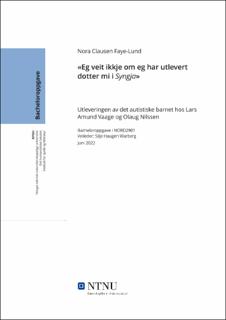| dc.contributor.advisor | Warberg, Silje Haugen | |
| dc.contributor.author | Faye-Lund, Nora Clausen | |
| dc.date.accessioned | 2022-07-16T17:20:02Z | |
| dc.date.available | 2022-07-16T17:20:02Z | |
| dc.date.issued | 2022 | |
| dc.identifier | no.ntnu:inspera:107174369:36981440 | |
| dc.identifier.uri | https://hdl.handle.net/11250/3006147 | |
| dc.description.abstract | Lars Amund Vaages Syngja (2012) er en roman som handler om hverdagslivet til foreldre som er pårørende til et barn med autismespekterforstyrrelse og begrensede språkferdigheter, samt ulike utfordringer som følger av dette tyngende ansvaret. Utgivelsen førte til etiske debatter i offentligheten omkring det å skrive om et språkløst, autistisk barn – et barn som verken kan lese eller ta til motmæle. Tilsvarende som Vaage, ble også Olaug Nilssens Tung tids tale (2017) – en samtidsroman som står i intertekstuell forbindelse med Syngja – møtt med etiske debatter og problemstillinger knyttet til representasjon og selvrepresentasjon, samt autonomi og barnets rett til personvern. I denne bacheloroppgaven har jeg utforsket det etisk-problematiske knyttet til utleveringen av det autistiske barnet hos Vaage og Nilssen – her med utgangspunkt i hva forfatterne selv diskuterer om utleveringsspørsmålet. I min analyse har jeg vist at både Vaage og Nilssen forsvarer at de har skrevet om sine barn innenfor skjønnlitteraturens rammer, men de argumenterer for at det ikke er like utleverende som å eksponere barnet i en mediesammenheng. Skillet mellom det skjønnlitterære og det offentlige rommet har blitt diskutert med utgangspunkt i Tygstrup og Holm (2007), som ser på litteraturen som en egen ramme og institusjon, som skiller seg fra en offentlig ramme. | |
| dc.description.abstract | Lars Amund Vaage’s Syngja (2012) is a novel about the everyday life of parents who are caretakers to a child with autism spectre disorder and limited language capabilities, and challenges related to this responsibility. The publication of the novel lead to ethical debates in the public regarding writing about a speechless, autistic child – a child who can neither read nor object. Like Vaage, was Olaug Nilssen’s novel, Tung tids tale (2017) – a contemporary novel in intertextual connection to Syngja – met with ethical debates regarding representation and self-representation, as well as autonomy and the child’s right to privacy. In this Bachelor thesis, I have explored the ethical challenges related to exposure of the autistic child in Vaage and Nilssen’s novels – here with a particular focus on what the authors themselves say about the question of exposure. In my analysis I have shown that both Vaage and Nilssen justify writing about their own children within the framework of literature, but they also argue that it is not as exposing as it would have been had it been in a media context. The divide between the fictional and the public space has been discussed based on Tygstrup and Holm’s (2007) theory which views literature as both a framework and institution which separates itself from the non-fictional public space. | |
| dc.language | nob | |
| dc.publisher | NTNU | |
| dc.title | «Eg veit ikkje om eg har utlevert dotter mi i Syngja» - Utleveringen av det autistiske barnet hos Lars Amund Vaage og Olaug Nilssen | |
| dc.type | Bachelor thesis | |
